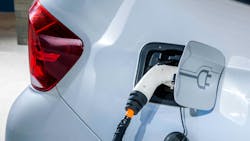Number of Electric Cars Worldwide Rises to Almost 42 Million
There were 14.8 million new electric vehicles registered worldwide in 2023 (electric vehicles running on battery power alone, plug-in hybrids and vehicles with range extenders). China is in the lead with over 9 million electric cars while the USA has claimed second place ahead of Germany. The number of new registrations of electric cars in Germany last year was almost 700,000. This brings the current tally of electric cars on German roads to 2,330,400 but this is not enough to achieve the goal set by the German government of 15 million electric vehicles by 2030.
The annual level of new registrations would have to double or triple in order to achieve the target. The Centre for Solar Energy and Hydrogen Research Baden-Württemberg (Zentrum für Sonnenenergie- und Wasserstoff-Forschung Baden-Württemberg -ZSW) has scrutinised the latest figures on electromobility.
The global count of electric cars in circulation at the end of 2023 was almost 42 million. More than half of these vehicles are registered in China, ahead of the USA in second place with 4.8 million electric cars and Germany in third place. Setting aside the Chinese figures, the highest growth rates in circulation were seen primarily in smaller markets like Belgium with 71 percent (192,400 vehicles) or Portugal with 54 percent (65,000 vehicles).
In terms of new registrations, the EU is the second largest market in the world after China. Around 2.5 million new electric cars were registered here in 2023, with the USA following in third place with 1.5 million vehicles. Electric cars still have the highest share of the total vehicle
market in Norway where four in every five new vehicles are powered by electricity.
Germany, by contrast, is seeing a significant slowdown in the momentum gathered in 2022, when the figures rose by 22 percent on 2021, and is now reporting that new registrations actually fell by 16 percent in the past year. One of several factors accounting for this development is that sales of plug-in hybrids have fallen sharply since the government subsidy scheme ended on 31 December 2022. It is also evident, however, that an 11 percent growth in cars run entirely on battery power did not fully compensate for this decline. The higher initial outlay on the purchase of an electric vehicle remains a frequently cited point of criticism. The relatively weak overall economic situation in Germany has probably also had a dampening effect on the development of electromobility, as have falling fossil fuel prices after the phase of high prices in 2022.
“There is a need for new incentives in the market in order to achieve the electromobility targets in Germany – 15 million electric vehicles in circulation by 2030 – and to encourage new momentum in climate action in the transport sector. The initiative for growth proposed by the
German government in greater support of electric company cars cannot amount to anything more than an initial step,” said ZSW staff member Andreas Püttner. “In view of the strict austerity budgets choking the public finances, there can be a major impetus in abolishing privileges for conventional vehicles – aka subsidies having an adverse impact on climate targets. Examples of steps which could be taken to come much closer to a 'level playing field', with the same conditions for cars with combustion engines and electric cars, would be to abolish tax breaks for fossil diesel fuels and for company cars with conventional engines,
known as the diesel concession and company car concession respectively, or to limit incentives strictly to company cars powered by electricity.”
Despite the weakness of the German domestic market, German manufacturers are successful on the international stage where VW, BMW and Mercedes all rank among the top 10 manufacturers and where VW has even moved up to third place in the statistics on new registrations, having sold just over one million cars overall. Compared to the industry
leaders BYD (China) and Tesla (USA), however, there is still a large gap in terms of numbers, with Chinese company BYD reporting sales of over three million electric cars and therewith another significant increase of 68 percent in the number of new registrations compared to
last year, thereby maintaining a confident lead in the rankings over the other manufacturers, while Tesla holds on to second place with 1.8 million sales.
The most triumphant model in the world by far last year was again the Tesla Model Y, which was sold over 1.2 million times. Tesla enjoys further success with its Model 3 in third place. The other electric cars in the top 10 worldwide all come from China, with the manufacturers BYD, GAC Group and SAIC increasingly widening their range of vehicles.
“If Germany is to achieve its climate control goals, there is an urgent need for attractive vehicles in the lower and middle segments in order to appeal to a larger customer base. If the German and European manufacturers do not fill this gap, there is a risk that other manufacturers, especially those in China, will seize this opportunity in spite of the introduction of punitive tariffs at European level in a bid to prevent this,” added Andreas Püttner.
